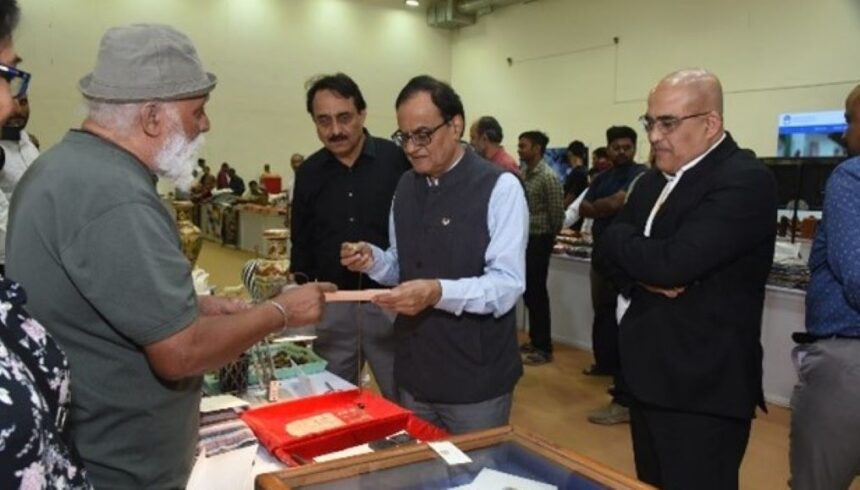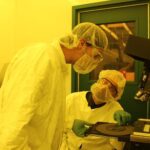Science and technology clusters come together: Principal Scientific Advisor to the Government of India, Professor Ajay Kumar Sood, chaired the first joint meeting of Science and Technology (S&T) Clusters held on 26-27 October 2023 in Jodhpur, Rajasthan. The meeting was organized by the Jodhpur City Knowledge and Innovation Foundation (JCKIF) and hosted by the Indian Institute of Technology (IIT), Jodhpur.
Launched in 2020, the City S&T Clusters are a flagship initiative of the Office of the Principal Scientific Advisor to the Government of India, established on the recommendation of the Prime Minister’s Science, Technology and Innovation Advisory Council (PM-STIAC). This initiative aims to address local challenges through S&T interventions by bringing together academia, R&D institutions, industries, startups and local governments. Currently, seven S&T clusters are functioning in Bangalore, Bhubaneswar, Delhi, Hyderabad, Jodhpur, Pune and the recently established Northern Region Cluster in Chandigarh, all working together to find solutions to regional problems through collaborative efforts.
In his keynote address, Prof. Sood highlighted that S&T Clusters are a unique initiative of the Office of the Principal Scientific Advisor, Government of India, focusing on translational aspects of research. While emphasizing the collective strength of clusters, he highlighted their potential to address regional challenges through synergistic S&T interventions. He hopes that with the clusters coming together at this joint cluster meeting, more cross-collaboration projects, interdisciplinary and aligned with national priorities, will be undertaken. However, he stressed the need to ensure the sustainability of the clusters in the long term and it is therefore important that each cluster works towards achieving its sustainability plan.
Referring to the recently announced draft National Policy on Deep Tech Startups, Prof. Sood suggested that clusters could collaborate effectively with Deep Tech startups operating within this policy framework.
Dr. Parvinder Maini, Scientific Secretary, Office of the Principal Scientific Advisor, Government of India, in his speech said, “Clusters have boosted entrepreneurship and innovation across the world and helped break down institutional boundaries. » She highlighted the role of S&T hubs as shared ecosystems and regional solution providers, while promoting competitiveness nationally and globally. Dr. Maini highlighted the leading role that S&T clusters can play in boosting India’s Global Innovation Index (GII) and contributing to the global economy.
Furthermore, Dr. Maini highlighted the importance of the joint meeting of S&T clusters as a platform for knowledge exchange, facilitating the sharing of best practices from established clusters with newer ones and fostering a learning environment mutual and growth between all clusters.
The two-day meeting saw in-depth discussions on the identified themes and opportunities for interdisciplinary collaboration between the clusters. Themes included: healthcare, energy and environment, agrotechnology and nutrition, STEM education, livelihoods through S&T and North East impact and industry 4.0 .
On the first day, joint presentations were made on four key themes by various S&T hubs. Ms. Rashmi Pimpale, CEO, Research and Innovation Circle of Hyderabad (RICH), Hyderabad made a presentation on the topic of health. This was followed by a presentation on the theme of Energy and Environment, delivered by Ms. Shipra Misra, CEO, Delhi Research Implementation and Innovation (DRIIV), Delhi. Thereafter, the following presentation on the topic of Agritech & Nutrition was delivered by Mr. Ravi Tennety, COO, Bengaluru Science & Technology Cluster (BeST), Bengaluru. The final presentation of the first day on the theme of STEM Education was delivered by Dr. Priya Nagaraj, CEO, Pune Knowledge Cluster (PKC), Pune. The presentations collectively highlighted the collaborative strength of the clusters in these overlapping areas, highlighting their role in driving collaborative S&T initiatives within their respective regions.
The second day began with a joint presentation on the theme Livelihoods through S&T delivered by Dr. GS Toteja, CEO, JCKIF, Jodhpur. The final joint presentation was made on the theme NorthEast Impact & Industry 4.0, delivered by Dr. M. Suar, Chairman and Dr. N. Misra, CEO of Bhubaneswar City Knowledge Innovation Cluster (BCKIC), Bhubaneswar. Some of the key takeaways from the second day included discussions on actively engaging clusters in harnessing traditional art to create livelihoods and enhance product value through online sales platforms. It was discussed that these efforts should be replicated in the Northeast states through BCKIC.
In his closing remarks, Prof. Sood reiterated the vital need for S&T clusters to strive to become self-reliant in the future. He highlighted that the joint meeting of S&T clusters demonstrated the power of an interconnected ecosystem of scientists, engineers and visionaries to drive innovation at an unprecedented pace. Professor Sood appreciated the diversity of thoughts among the participants and said: “It is clear that progress thrives on inclusiveness and a willingness to embrace different viewpoints. »
During the two-day meeting, attendees had the opportunity to witness innovations and technological breakthroughs, ranging from AI-based solutions to sustainable energy initiatives. IIT Jodhpur students also showcased cutting-edge technologies and research in the field of medical technology. Professor Sood also launched a healthcare compendium focused on deployable technologies.
The event strengthened the potential of these clusters’ collaborative efforts and showcased their commitment to driving positive change through science and technology.











